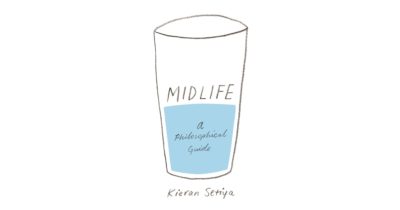Kieran Setiya, an MIT philosophy professor, wrote a philosophically informed self-help book. It’s called Midlife: A Philosophical Guide. That doesn’t sound like it would work. But I found it helpful as a person who just turned 40 and wants to think and write about it.
Setiya approaches midlife from the perspective of diagnosing and solving the ‘midlife crisis,’ which, as he points out in the first chapter, isn’t a particularly old idea. At least in its explicit form. Rather than a crisis, midlife is really more of a vantage point. The person at midlife can see both a long past and a long future. Maybe the past worked out for them, and maybe the future will.
Or not.
So how do we overcome these issues? Setiya begins with a couple of pieces of advice: focus on the happiness of others by getting outside of yourself, and try doing things for pure enjoyment rather than for instrumental uses. Get a hobby. Take up pleasure reading. Become a philosopher, and so on.
It’s counterintuitive advice. Wouldn’t we do better to focus on our own happiness in order to become happy? Setiya says “no,” and he’s right. Sometimes by focusing too intently on something, we lose it.
Options and Regret
It’s easy to look back at our youth and lament the loss of the open-ended future. We look back at life in our teens or 20s and think we could’ve done a million things or been a million different people. Maybe we like who we became, or maybe we don’t. Either way, we made those choices, and we can’t look at those other options.
But Setiya pushes us to change our perspective on all this. Would those other roads have taken us to better places? Maybe. But in most cases, probably not. For most of us, we’re really after the sense of possibility or open-endedness. And we look at these possibilities from our midlife perspective of having a more stable identity.
To really imagine life in our teens or 20s, we must give that up. Remember how scary it was to not know who you were or where you were going? We didn’t yet have a solid sense of self. And it makes little sense to implant our better grounded selves into those younger thoughts and bodies.
Setiya argues that this point holds even for those of us who dislike our current lives and regret our past choices. We can always wish we chose differently – chosen a better career or different spouse, had (or not had) kids, and so on. But we must look at the total picture of our lives – our friends, the things we’ve learned – and appreciate that many of these things depend on the very choices we say we regret.
Maybe a person has a bad career, but they made their best friends on the job. Maybe they chose the wrong spouse, but from that spouse came the kid they love.
Setiya advises us to compare the total story of our lives to the uncertainty and abstraction of the paths we never chose. What would’ve really come from those other paths? It’s not like we can know. Pining away for the rosiest, most positive interpretations of alternative choices is not only unhelpful to our mental health, it’s also quite likely inaccurate.
Death and Purpose
At midlife, our view of life extends decades in both directions. We see both an extensive past and a (potentially) extensive future. But when we look forward, we tend to focus on death and destruction.
Setiya considers a wide range of philosophical thought on death and the fears it presents us. He considers everyone from Epicurus and Lucretius to the modern work of Derek Parfit.
He finds Epicurus unconvincing, though he’s not much more impressed by Parfit. While he considers the symmetry argument and responses, he thinks the Epicurean can’t explain away the rationality of fearing the deprivation of pleasure and experience that confronts us at death. He does, though, think we can draw comfort from the fact that we cannot, by nature, live forever.
Why worry about something you can’t change?
For my own view, I think Setiya sells the Epicurean view short. In particular, the Epicurean pushes us to consider whether we really gain any additional or higher pleasure from continuing to experience the simple pleasures in life. Once we eliminate suffering, the Epicurean thinks we achieve a plateau. And while it might make sense to lament the lack of additional time with friends and loved ones, doesn’t such a desire run into the very same risks (uncertainty, etc.) that Setiya pushes us away from when we express the desire for alternative paths in life?
Telos and Midlife
Setiya finishes with an excellent piece of advice that ties back to his starting point.
He advises us to think of life in a less telic way. Life isn’t just a series of endless projects with fixed goals. Rather, we should think about it through open-ended activities.
Why not spend time enjoying a book, reading it for pleasure rather than thinking of it as another task with a fixed goal of finishing? And why not spend more time hanging out with friends?
Why not, indeed?
